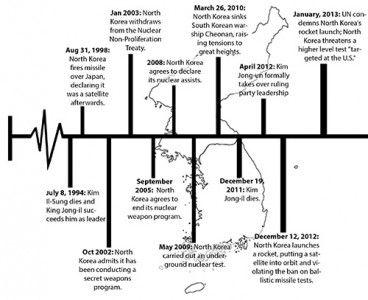
Despite threats of violence against the U.S. made by North Korean leader Kim Jong-un, a number of members of the Boston University community said they do not perceive the claims as serious and are not concerned.
BU international relations professor Joseph Wippl said the threats are a political move made to gain international attention.
“[North Korea] does a lot of threatening to establish independence, and when anyone tries to attack them, they get serious repercussions,” he said. “It is a constant way of creating tension and attempting to get neighboring countries and the U.S. to give more consideration to North Korea.”
On Friday, Jong-un made a public statement vowing retaliation against the U.S. and allies after the United Nations Security Council approved new tightened sanctions in response to a Dec. 12 North Korean rocket launch.
Jong-un also swore to test a nuclear weapon on Thursday.
In late December 2011, North Korean leader Kim Jong-il died, and his third son Kim Jong-un took over as supreme party and military leader.
Former German Ambassador to North Korea Consul General Friedrich Löhr said he is not surprised by the threat.
“North Korea acts this way because they feel the need to show power and strength in order to be taken seriously,” he said. “They desperately want to meet the U.S. at the same level … This is important to show their people how good and strong this regime is and that its the ‘right regime,’ often when something important happens in South Korea they want to match this.”
Löhr said because Jong-un is young, he must show he is a strong leader.
“I think Kim Jong-un is surprising us, in the last months there was little talks about military threats,” he said. “In North Korea there was a lot of stress about consumption on well-doing, living well, and now they are apparently in a way a step back.”
Neighboring countries should not be too fearful of the threats, Löhr said.
“This is a problem that surrounding powers have that they could easily deal with, but they might not because it’s risky,” he said.
Wippl said the world must adjust to living with North Korea’s irrationality.
“They [North Korea] are such an anomaly in a world that is developing rapidly,” he said. “They are like a sore thumb when compared to China and South Korea, modern, developed, industrialized societies.”
Several BU students said they agree that North Korea’s actions are done for attention on the global stage.
After living in South Korea for six years, School of Management freshman Brian Shin said North Korea’s threats are an empty talk.
“They [the North Korean government] say that kind of stuff very frequently,” Shin said. “I don’t take it too seriously anymore. It’s more like a child acting out.”
Shin said he believes South Korea needs to help its neighbor to the north.
“If it’s economically feasible I would be pro-unification,” he said.
Ann Jacob, an international relations major focusing in foreign policy and security studies, said she did not expect Kim Jong-un to follow his father’s actions.
“It’s kind of unfortunate he’s stuck to his father’s ways and now threatening the United Nations and United States with missiles,” Jacob, a College of Arts and Sciences junior, said. “They [North Korea] have gotten a cycle of getting aid. In order to help the cycle you need to help North Korea grow, let it come out of the dark— look at South Korea, it’s bright.”
Jong Kim, a CAS sophomore who was an interpreter with the South Korean army from 2010 to 2012, said North Korea could gain benefits from opening relations with South Korea rather than making threats.
“If North Korea came to us [South Korea] and was more open, it would be a more developed country,” Kim said. “In the long run we’d have a better economy. It would definitely be beneficial to both countries.”
Some students said attention must be given to other social issues in North Korea.
“I would like to focus on the starvation problems they have there, rather than on the military,” Shin said.
Jacob says that the threats create an opportunity for U.S. officials to turn their gaze to North Korea and look into other issues.
“Whenever there is a nuclear launch we pay attention,” she said. “We are not paying attention to the human rights violation going on there and I think that needs more attention.”
This is an account occasionally used by the Daily Free Press editors to post archived posts from previous iterations of the site or otherwise for special circumstance publications. See authorship info on the byline at the top of the page.



